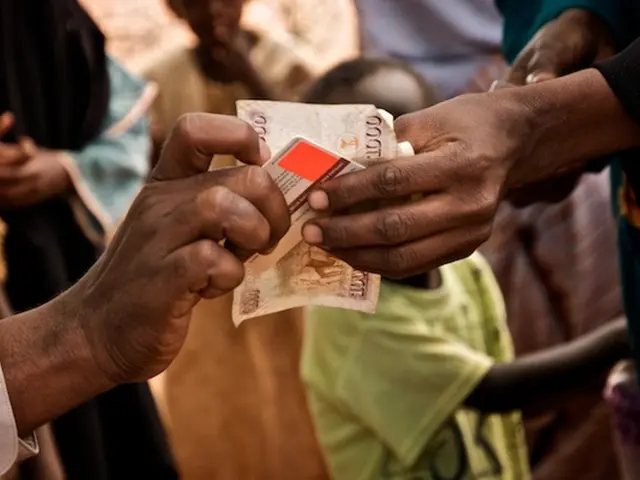The Ultimate Guide to Owning Poker at the Big Blind: Tips and Tricks for Streaming Pros
Mastering Online Poker: Winning Strategies for Newbies in Cyberspace
Struggling to consistently win chips and money in the big blind? It's time to turn that around and make your opponents think twice about swiping your blinds every time. This article, infused with insights from Jurojin Poker, will show you how to become a menace from the big blind—and potentially boost your win rate. We'll explore table position, stack depth, aggression, and more. Let's take a seat and dive in.
Dominate Your Opponents at the Big Blind
When you're playing in the big blind, it can be a dedicated battle to collect chips and cash, no matter how talented you are at poker. The positional disadvantage you face in the big blind is tough to overcome, even for the poker world's legends. However, there are several strategies you can employ to minimize your losses and have your opponents questioning their bluffing decisions.
Using Jurojin Poker's range builder and other features, we'll demonstrate ways to start winning more pots and hopefully increase your win rate. Buckle up, and let's get this poker journey underway.
The Art of Making Your Opponents Rue the Day They Tried to Steal Your Blinds
One of the most crucial things online poker beginners learn early on is the power of position. They learn to play tight from the earlier positions and become more aggressive as they get closer to the button. According to Jurojin Poker's free range builder, a typical opening range from under the gun is 12.7% of hands, which skyrockets to an astounding 43.7% on the button. This means:
- The button attempts to steal the blinds nearly half the time the action folds to them, often with subpar holdings, like king-nine offsuit, queen-three suited, and ten-six suited. Utilize these statistics for your blind defense strategies.
- If you allow your opponents to help themselves to your blinds freely, you'll become an enticing target. Conversely, if you only defend your big blind with premium holdings, you'll struggle to get action and extract value from those hands. This leads us to our first tip.
Tip 1 - Sharpen Your Preflop Play: Loosen Up and Get Aggressive
Building solid foundations for your poker knowledge is vital, and those foundations start with your preflop starting hand strategy. Beginners often make mistakes that snowball in the later streets due to poor preflop play.
Many novices adhere to the phrase "tight is right," resulting in them playing a ridiculously tight range of hands, which works against non-thinking opponents but isn't enough against seasoned grinders. Jurojin Poker's free range builder suggests the button should open with 43.7% of their hands, which includes all pairs, suited connectors, and numerous other hands considered marginal by most beginners.
- To defend your big blind more frequently, you need to play a wider range of hands. The chips you already have in the pot after posting the big blind mean you're already profitable when you see a flop, increasing your pot odds.
- Playing a more extensive range allows you to take advantage of the button's aggressive playstyle and apply pressure with both strong and marginal hands. This is because aggression isn't limited to bluffing—it also means betting and raising when you have the goods to force others to fold.
Tip 2 - Boost Your Performance When Short-Stacked
Nobody likes hitting the felt with a short stack, but it's a common occurrence in tournament poker. What beginners need to realize is that you can still defend your big blind with a short stack. Why? Because you get to realize the full equity of your lesser-strength hand.
When you're short-stacked, you should play an unorthodox range of hands because you're guaranteed to see all five community cards. Defending with king-nine with a deep stack means you're unlikely to see all five cards, but when you're short-stacked, you can call, make a pair, or hit a draw, and put your short stack into the pot, giving you the opportunity to see all five cards or force your opponent to fold.
You may discover that your opponent continuation bets less when you're short-stacked due to fear of getting jammed all-in. This means you could see more turn cards for free.
Tip 3 - Three-Bet Suited Connectors When Deep-Stacked
Suited connectors are the perfect hand for three-bet bluffing from the big blind when facing an opening raise. Three-betting with offsuit Broadway hands can lead to difficult decisions postflop, and, as a beginner, you may be left guessing about the best play.
By three-betting with hands like eight-seven suited, you can play aggressively postflop by continuing your bluff on your draws.

Tip 4 - Raise More Against Flop C-Bets, Especially Small Ones
Check-raising is a powerful tool in poker and one that you should utilize more, especially when facing a small continuation bet. If a late position player raises, you call in the big blind, the flop comes [10♣ ** 6♦ ** 4♥ ]**, you check, and the initial raiser makes a small continuation bet, check-raising with hands like top pair with a decent kicker or even draws can get your opponent to fold, build larger pots when you have the goods, and prevent yourself from relying solely on holding the proper hand at showdown. If they do call, reassess the situation during the turn and evaluate their potential holding with a tighter range of hands.
Tip 5: Defend Against Opponents With Low C-Bet Frequency
If you notice that an opponent frequently raises preflop but then doesn't fire a continuation-bet, you should defend your big blind more frequently against them. Pros generally suggest a c-betting frequency of around 75-80%, so anything below that is considered low. If an opponent is only c-betting 50% of the time they have the opportunity to do so, that is a very low figure.
You can defend wider because your opponent is less likely to make a continuation bet and put you under pressure, allowing you to see more turn cards for free. From the flip side, an opponent who has a high continuation-bet frequency can be an annoyance to deal with. You can either tighten your defending range so that you are defending with stronger hands, or check-raise more because they are likely to c-bet 100% of the time.
Tip 6: Be Selective When Probing With Strong Hands
Probe betting has its purposes, but you must avoid overusing the move. Probe betting refers to betting out-of-position after a preflop aggressor doesn't make a continuation-bet on the flop. For example, the button raises, you call in the big blind, and check the flop. The button checks behind, and you lead out on the turn. Your lead is a probe bet.
Many players will make a probe bet 80%+ of the time they have top pair or another strong hand, which may seem logical. However, if you probe with all your decent hands, it makes your checking range appear weak, opening the door for your opponent to bluff whenever you check. Instead, consider check-raising some of your stronger hands, which keeps your opponents guessing, leading them to make mistakes.
Tip 7: Engage More in Pots With Recreational Players
It should be obvious that you're more likely to win more chips and cash by playing against players who are less skilled than you. Many recreational players have a tendency to play a particular way, which allows you to exploit them once you identify it. For example, they may only continuation-bet if they have a monster hand, they may have a super-tight opening range, or they could c-bet 100% of the time.
If you identify a player you think is weaker than you and has tendencies you can exploit, consider expanding your big blind defending range so that you can participate in more pots with them. The more mistakes they make, the more likely it is that you'll help yourself to their chips!
Bonus: User Jurojin's Free Online Poker Range Builder to Elevate Your Game
Knowing which hands are ideal to defend your big blind used to be a case of trial and error over countless, if not countless, hands. Thanks to Jurojin Poker's free range builder, you can quickly determine which hands can be profitably used for defending your big blind, and play poker like a pro. While the Jurojin Poker range builder is free to use, it is still robust. It includes presets such as opening ranges for all table positions, ranges for how to act once another position has opened, a section for defending the small and big blind, and even four-bet ranges for when pots get spicy.
Defending Poker Strategy Conclusion: Should You Always Defend the Big Blind?
Although this article suggests that you should defend your big blind more than you currently do, it's important not to start defending with any two cards against every steal attempt. Consider the originator's position, their playing style, the effective stack size, and their postflop tendencies.
By using Jurojin Poker's free range builder tool, you can easily nail down your preflop hands, bringing you closer to mastering the art of defending the big blind.
Matthew Pitt, a native of Leeds, West Yorkshire, in the United Kingdom, emerged in the poker industry in 2008 and worked for PokerNews since 2010. In September 2010, he became the editor of PokerNews. Matthew retired from live reporting in 2015, focusing on his role as Senior Editor for PokerNews.
- Working with Jurojin Poker's range builder and other features, you can discover ways to defend the big blind more frequently and win more pots, potentially boosting your win rate.
- When playing in the big blind against opponents with low continuation-bet frequency, you can defend your big blind more often because they are less likely to apply pressure with a continuation bet, allowing you to see more turn cards for free.






